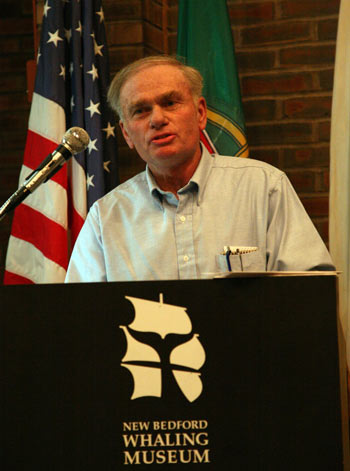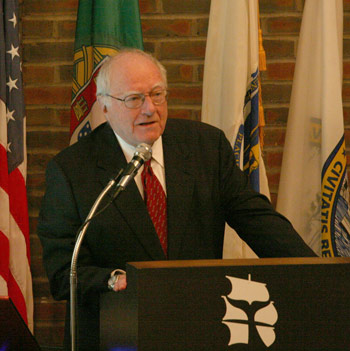Fisheries Summits, Rallies, and Marches Challenge New Management Regime

Fisherman Jim Ruhle, NC. "The interpretation of the MSA by the National Marine Fisheries Service (NMFS) lawyers and the environmentalists, have made it into a stringent law. It is a biological impossibility for all stocks to be brought up to optimum levels, as NMFS is calling for. The 10 year deadline was arbitrary and does not fit all species." ©Photo by Sam Murfitt
After a similar meeting in Gloucester, New England fishermen met in New Bedford, Massachusetts, on March 8 to discuss the pending shift to a catch share system that many fishermen feel they are being forced to accept.
Some, including boat owner Carlos Raphael of New Bedford, said the low allocations under catch shares will drive 50 percent of the fishermen out of business in a matter of months.
The shift to an incomplete sector management system and catch shares as been driven by a deadline some say is arbitrary. U.S. Representative Barney Frank called for a moratorium. But, he told the Fishermen’s Voice, the new Matopma; Pceamic and Atmospheric Administration (NOAA) head, Jane Lubchenco, “is determined to go forward, in spite of the fact that catch shares is just another term for transferable quota, which according to the re-authorized Magnuson Stevens Act (MSA) of 2006, requires a 2/3 majority vote in Congress, that the catch shares plan does not have.”
Frank said there is no way to get a bill passed in time for the May1 deadline for implementation of catch shares. However, he plans to work for an amendment that will strengthen the MSA regarding economic impacts to fishermen and fishing communities.
Jim Ruhle, fisherman from North Carolina said, “I don’t think Congress meant for the MSA to eliminate commercial fishermen in the U.S. But the interpretation of the MSA by the National Marine Fisheries Service (NMFS) lawyers and the environmentalists, have made it into a stringent law.”
Ruhle said it is a biological impossibility for all stocks to be brought up to optimum levels, as NMFS is calling for. “The 10 year deadline was arbitrary and does not fit all species. Barney Frank said it was unacceptable and got it changed for flounder.”
Ruhle said he had “zero confidence in the infamous Albatross trawl survey data that was used for determining quota by the Northeast Science Center. I have all the faith in the world in the Woods Hole Oceanographic Institute. They are very capable people. But in the survey, the gear used was designed for ground fish on George Bank 44 years ago. It was used in an overspread condition, with the foot rope rigged in a way that had the net off the bottom, and greatly increasing escapement. It was the world’s longest and worst survey.”
Carlos Raphael said, “If there are no more fish, then buy back the permits. If NMFS cut it’s $300 million dollar budget by 50 percent, they could solve the problems in fishing by buying back the permits and boats. If they were so anxious to solve the problem, this would leave more fish for those remaining.”
“I’m a believer in the system. I want my kids, and my grand kids to be able to fish. I’ve been a fisherman for 30 years, I’m 57 years old,” said Rafael.
Dr. Brian Rothshield said the intent of the summit was to put some things on the table for a dialogue with the agency (NMFS). Among them, “catch shares, the scallop and yellow tail problem, and closed areas on George Bank.” Rothshield teaches at the School for Marine Science and Technologyin Dartmouth, MA. But the focus of the summit was on catch shares.

Dr. Brian Rothshield, SMAST. “With catch shares, from a public policy perspective, where we are headed is unclear. Catch shares are not only unviable, there would be consolidation and a loss of jobs.” ©Photo by Sam Murfitt
Rothshield was formerly the Head of Policy and Planning at the National Marine Fisheries Service (NMFS). He was responsible for the implementation of the 1976 Magnuson Stevens Act. Among other things he organized the national management council system.
“With catch shares, from a public policy perspective, where we are headed is unclear,” said Rothshield. “Catch shares are not only unviable, some components would do well, others not. There would be consolidation and a loss of jobs.”
He also cited the inequality in fishing history and the disparities between stock assessments and what fishermen believe could be caught.
The summit he said, “laid out an opportunity to amend the MSA. We could demonstrate through amendments that we can do a better job of managing.” He referred to the need for flexibility and to the words of the new NMFS administrator Eric Schwab who spoke at the summit. “The language of the MSA law contains the need for flexibility. Now we need to determine how flexibility can be implemented,” said Schwab.
Frank said he will seek an arrangement that will provide needed flexibility in the law, while meeting stock restoration targets. He suggested “the shift to catch shares might be extended to 3 years, while at the same time meeting targets.” He said he had tried to incorporate flexibility into the 2006 changes to the MSA, but it met with resistance from environmental groups that said without rigidity, over-fishing would never stop.
Frank said he had a meeting planned for the third week in March with members of the House to come in and open the subject to discussion. He said, some Repub- licans are now supporting these changes. He hopes to have something through Congress by the fall. As a non-partisan issue it could pass with a simple majority.
At the Boston waterfront meeting on March 22, Lubchenco, about 70 fishing industry representatives, representatives from banking, non-profits, and many levels of government, including Senator Kerry, MA, Congressmen Barney Frank, and John Tierney gathered in a closed door meeting.
New Bedford Mayor Scott Lang said, “NOAA does not understand the impact of the science they are using. They are using science that is three years old. It is a snapshot of something that no longer exists. There is a need for science that can inform an industry that has to make business plans. The banks won’t wait, families that need to be fed won’t wait. NOAA needs to get its numbers right.”
Lang said, “We need conservation, but conservation without undue harm to the fishing families. If NOAA wants to do this they need to have their program organized before they roll it out. For NOAA to call it a work in progress is an insult and another instance of their indifference, and an arrogance that has infused this agency.”
NOAA chief Lubchenco told the group she has been advised by the Investigator General’s office to hold off on dismissing NMFS chief law enforcement officer Dale Jones. Investigator General Todd Zinser had earlier this month called for his dismissal. Zinser told a U.S. House oversight committee he had evidence that Jones and other agents charged foreign travel to an $8 million fund made up of fines from fishermen. During a subsequent investigation by the IG’s office Jones had ordered documents shredded.
The IG’s office reported they do not advise on dismissals. Senator Kerry, and Congressmen Frank and Tierney renewed calls for Jones’ dismissal at the Boston meeting. The Gloucester NOAA polices federal waters from Maine to the Carolinas. Charges of abuse of power, strong arm tactics, and excessive fines have been long standing complaints by fishermen of federal fisheries law enforcement.
